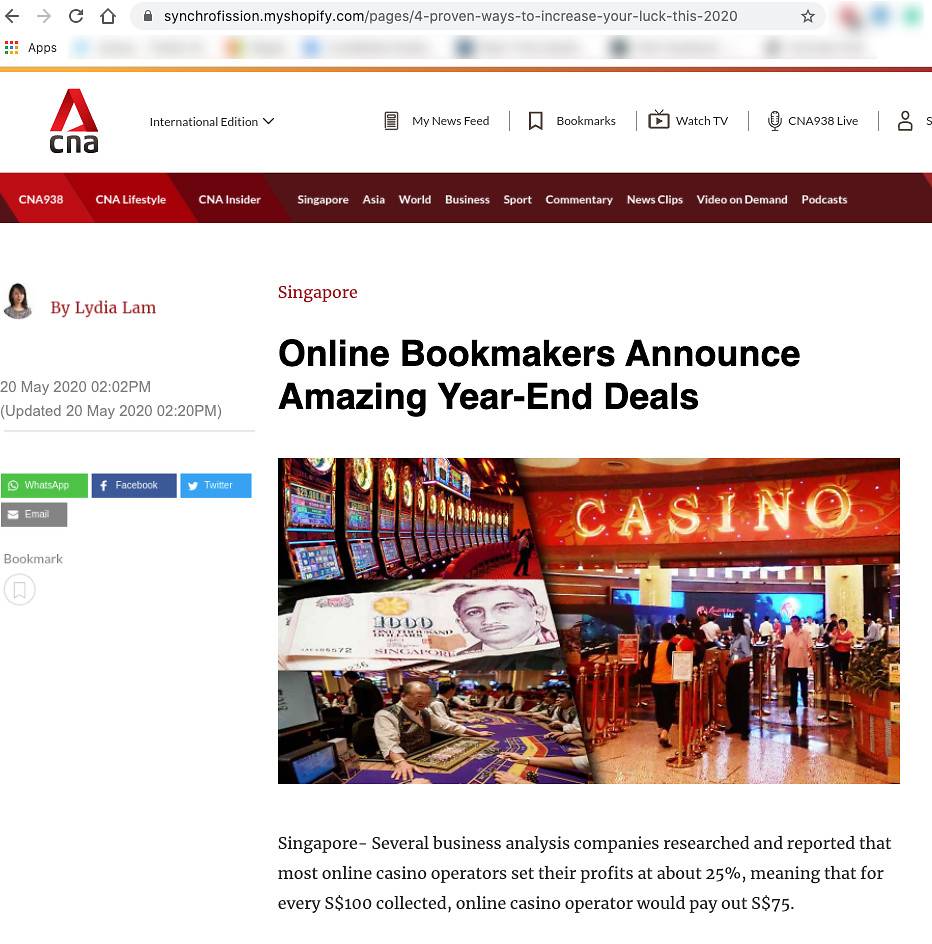Singapore
Some of these ads lead to webpages masquerading as the CNA website and have links leading to online gambling sites.
The scam ads that appear on users’ Facebook news feeds would lead them to sites like these emulating the look and feel of a CNA news article, complete with an author’s byline and picture.
SINGAPORE: Facebook has removed ads for webpages falsely masquerading as CNA news articles and taken down Facebook pages linked to these fake sites.
In response to CNA queries, a Facebook spokesperson said the social media platform has “taken action” against these ads and accounts in question. It has disabled ad accounts associated with these fake webpages, as well as unpublished Facebook pages pointing to them. However, it did not reveal how many ads or pages were removed or disabled.
READ: Facebook reports spike in takedowns of hate speech, terrorism
READ: CNA debunks fake tweet announcing school closure due to coronavirus outbreak
In recent weeks, several readers have notified CNA of Facebook ads that led to scam websites emulating the look of its news articles, including using its journalists’ bylines and photos. One reader said the ads were “shown multiple times via different accounts” on Facebook mobile, and they led to a fake news article headlined “Midnight Magic: 7E Cashier Resign After His Fortunate Night Shift”.

One of CNA’s readers said a scam ad led the person to this webpage, and the ad was reported to Facebook in early May.
Another reported seeing a sponsored post for what seemed to be a news article by CNA with the headline “Online Bookmakers Announce Amazing Year-End Deals”.
CNA did not publish any of these articles.
“Our advertising policies prohibit advertisements that are misleading or false, and we have taken action against the ads and accounts in question,” the Facebook spokesperson said, adding that users should report such content immediately by tapping the three dots in the top right corner of the ads.
Some of the scam webpages were hosted on Shopify, a company which provides tools to build e-commerce websites. When contacted, a company spokesperson said that two sites flagged by CNA have been taken down. It did not respond to a query on whether there were similar sites impersonating CNA on its platform.
The spokesperson added that Shopify “constantly” monitors its platform and takes down sites that are suspicious in nature or breach its Acceptable Use policy.
“We deploy internal tools to monitor for fraudulent activity across the entire platform and we take action to investigate and close shops when necessary, as was the case with this matter,” the spokesperson said, adding more than 4,500 online stores were closed in March this year due to breaching of its Acceptable Use policy.
The scams appear to be capitalising on how Singaporeans are turning to official news agencies like CNA during the ongoing COVID-19 outbreak.
Singapore authorities have issued advisories telling people to beware of similar scams.
HOW TO IDENTIFY SCAM SITES
The following is a guide to identifying suspicious and possibly fraudulent sites which use doctored CNA articles:

The Facebook ads led CNA readers to websites like these.
- Look at the URL on the top of the web page. The URL of a legitimate news article from CNA will start with channelnewsasia.com or cna.asia. In the example above, the URL starts with synchrofission.myshopify.com which is not linked to CNA.
- Go to the CNA website at cna.asia or channelnewsasia.com and click on the search icon. If you are unable to find the article on our website, it was not published by CNA.
- Click on the author’s name. On CNA’s webpage, doing so will lead you to the journalist’s profile and a list of stories published by the person. In this example, you will not be able to click out to a different webpage.
- Click on the share icons. You should be able to share the CNA article via the icons indicating the various social media platforms such as WhatsApp, Facebook, Twitter and LinkedIn. Here, only WhatsApp, Facebook and Twitter are available. Another giveaway: The design of the share icons are from a template no longer used by CNA.
- Check the embedded links. CNA usually includes Web links to other relevant stories it has published or to the authoritative source of the news. In this example, all the embedded URLs lead to https://facket-openting.com/click and, when clicked, redirects to the IBC9 online gambling site.
Without clicking through, you can put your mouse cursor over the link to see where it will direct you to; if you are using a mobile device, you can do a long press on the highlighted text to surface the URL. - Compare the webpage to articles on CNA’s official site. CNA does not have a feature for Facebook users to leave comments at the end of the article. In the example above, the fake website includes Facebook user comments, and when you click on the user’s profile, it redirects to the IBC9 website.




